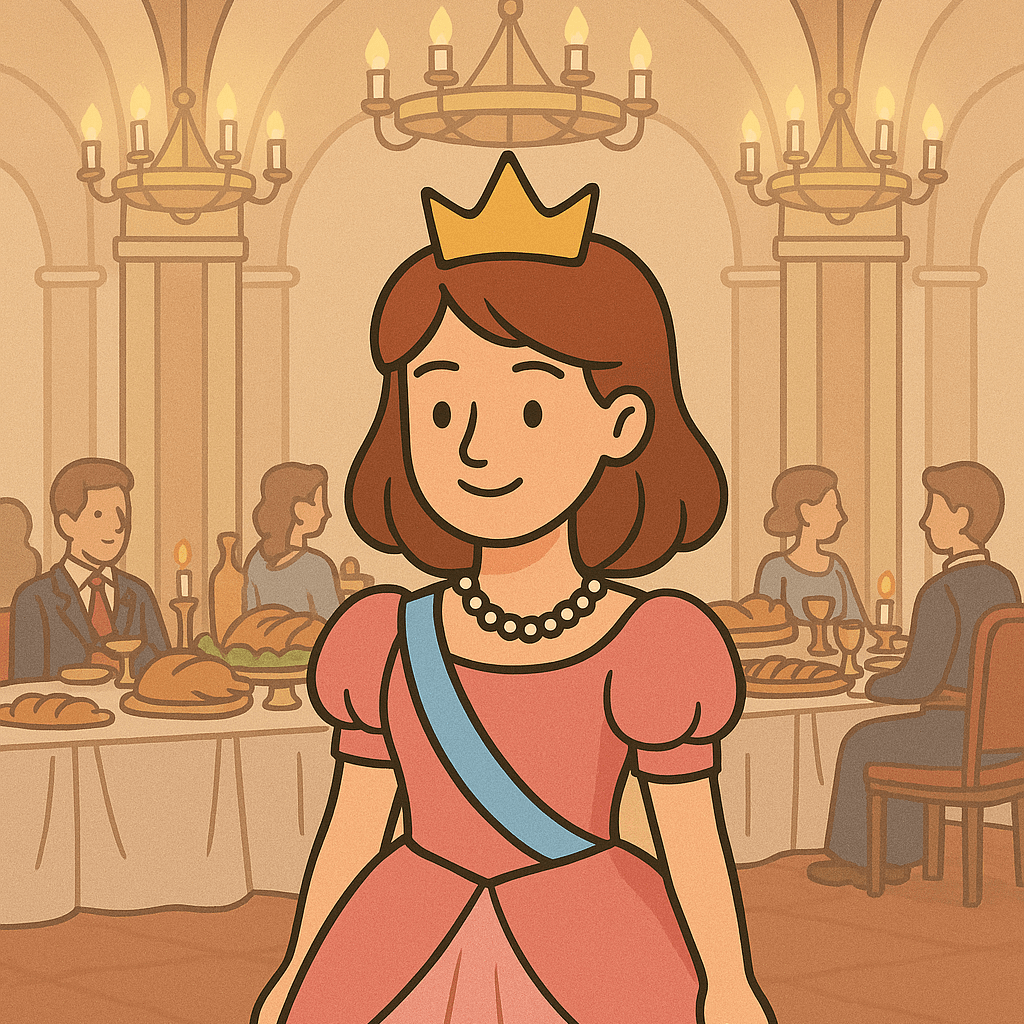Princess
Definition
The term "princess" describes a female member of a royal family, especially the daughter or granddaughter of a king or queen, or the wife of a prince.
Parts of Speech
- Noun
Pronunciation
American English
- IPA Pronunciation: /ˈprɪn.sɛs/ or /ˈprɪn.sɪs/
- Respelling: PRIN-sess or PRIN-sis
British English
- IPA Pronunciation: /ˈprɪn.sɛs/ or /ˈprɪn.sɪs/
- Respelling: PRIN-sess or PRIN-sis
Etymology
The word "princess" originates from the Old French "princesse," derived from the Latin "princeps," meaning "chief" or "leader." It entered Middle English in the 14th century to denote the female counterpart of a prince.
Derivatives
- Princessly (adjective, rare)
- Princesshood (noun)
- Princedom (noun, related)
- Princessship (noun, rare)
- Princess-like (adjective)
Synonyms
- Royalty
- Duchess
- Heir (female)
Antonyms
- Commoner
- Peasant
- None
Usage
The term "princess" is used in cultural, political, and fictional contexts. For example: "The princess was admired for her charitable work," or "The story features a princess who embarks on an adventurous journey."
Related Terms
- Prince: The male equivalent of a princess.
- Monarchy: A system of government led by a king, queen, or royal family.
- Queen: A female monarch or the wife of a king.
Detailed Definitions
Noun
- A female member of a royal family: Refers to the daughter or granddaughter of a monarch.
- Example: "The princess attended the royal banquet."
- The wife of a prince: Refers to a woman who has married a prince.
- Example: "The princess was celebrated for her elegance."
- A term of endearment or playful nickname: Refers to calling someone "princess" affectionately or humorously.
- Example: "He called his daughter a princess as he handed her the gift."
princess



🇨🇳 Mandarin
- 公主 (gōngzhǔ) - meaning "princess"
- IPA: /kʊŋ˥.ʈʂu˨˩˦/
- English respelling: kung-zhoo
- 王妃 (wángfēi) - meaning "queen" or "princess"
- IPA: /wɑ̌ŋ.féi/
- English respelling: wang-fey
🇮🇳 Hindi
- राजकुमारी (rājakumārī) - meaning "princess"
- IPA: /ɾaːd͡ʒkʊmaːɾiː/
- English respelling: ra-jaku-mari
- युवरानी (yuvarānī) - meaning "princess" or "queen"
- IPA: /juvɾaːniː/
- English respelling: yu-varani
🇪🇸 Spanish
- Princesa
- IPA: /pɾinˈθesa/ (Spain), /pɾinˈsesa/ (Latin America)
- English respelling: prin-the-sa (Spain), prin-se-sa (Latin America)
- Infanta - title given to the daughters of the Spanish King, except the heiress
- IPA: /inˈfanta/
- English respelling: in-fan-ta
🇫🇷 French
- Princesse
- IPA: /pʁɛ̃sɛs/
- English respelling: prin-ses
- Dauphine - wife of the Dauphin, the heir apparent to the throne of France
- IPA: /dofin/
- English respelling: do-fin
🇸🇦 Modern Standard Arabic
- الأميرة (al-amīrah) - meaning "princess"
- IPA: /alʔaˈmiːra/
- English respelling: al-a-meera
- الشريفة (al-sharīfah) - title for a noble lady, often used to denote princesses in some regions
- IPA: /aʃʃaˈriːfah/
- English respelling: ash-sha-ree-fah
🇧🇩 Bengali
- রাজকন্যা (rajakanyā) - meaning "princess"
- IPA: /ɹaːd͡ʒkʊnjaː/
- English respelling: raja-kun-ya
- জবাবি (jobabi) - another term used for "princess"
- IPA: /d͡ʒobabi/
- English respelling: joba-bi
🇧🇩 Bengali
- রাজকন্যা (rajakanyā) - meaning "princess"
- IPA: /ɹaːd͡ʒkʊnjaː/
- English respelling: raja-kun-ya
- জবাবি (jobabi) - another term used for "princess"
- IPA: /d͡ʒobabi/
- English respelling: joba-bi
🇵🇹 Portuguese
- Princesa
- IPA: /pɾĩˈsesɐ/
- English respelling: prin-se-sa
- Infanta - title given to the daughters of the Portuguese King, except the heiress
- IPA: /ĩˈfɐ̃tɐ/
- English respelling: in-fan-ta
🇮🇩 Indonesian
- Putri
- IPA: /putri/
- English respelling: pu-tree
- Putri Mahkota - meaning "crown princess"
- IPA: /putri makhota/
- English respelling: pu-tree mah-ko-ta
🇩🇪 German
- Prinzessin
- IPA: /prɪnˈt͡sɛsɪn/
- English respelling: prin-tses-sin
- Kronprinzessin - meaning "crown princess"
- IPA: /kroːnprɪnˈt͡sɛsɪn/
- English respelling: krohn-prin-tses-sin
🇯🇵 Japanese
- 姫 (hime) - meaning "princess"
- IPA: /çime/
- English respelling: chi-me
- 王女 (ōjo) - meaning "royal princess"
- IPA: /oːd͡ʑo/
- English respelling: oh-jo
🇻🇳 Vietnamese
- Công chúa
- IPA: /kɔ̌ˀŋ˧ ʈwəː˧˧/
- English respelling: kong-chua
- Hoàng tử phụ nữ - literally "female prince", another term for princess
- IPA: /hwäːŋ˨˩˦ tu˧˦ fu˧˧ ɲu˧˧/
- English respelling: hwang-tu fu nu
🇰🇷 Korean
- 공주 (gong-ju) - meaning "princess"
- IPA: /k͈oŋ.d͈ʑu/
- English respelling: kong-ju
- 황녀 (hwang-nyeo) - meaning "imperial princess"
- IPA: /hwaŋ.njʌ/
- English respelling: hwang-nyuh
🇹🇷 Turkish
- Prenses - meaning "princess"
- IPA: /pɾɛnsɛs/
- English respelling: pren-ses
- Şehzade - female version can be used to refer to a princess
- IPA: /ʃehzaːdɛ/
- English respelling: sheh-zade
🇵🇰 Urdu
- شہزادی (shēhzādī) - meaning "princess"
- IPA: /ʃeːzaːdiː/
- English respelling: sheh-zaa-dee
- بادشاہزادی (bādshāhzādī) - literally "king's daughter", can be used for princess
- IPA: /baːdʃaːzaːdiː/
- English respelling: baad-shaah-zaa-dee




.webp)
